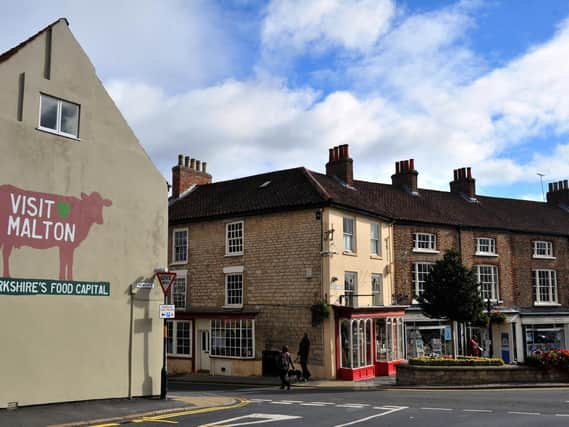First steps towards a becoming Yorkshire's first minimal waste Circular economy market town taken by 'food capital' Malton.


Circular Malton & Norton, a pilot project bringing together businesses, authorities and the public, has secured funding from the Rural Community Energy Fund to conduct a feasibility study into establishing a community anaerobic digester.
A Circular economy focuses on keeping waste to an absolute minimum in order to protect the environment and the digester would use local food and agricultural waste to create heat and energy for the towns of Malton and Norton.
Advertisement
Hide AdAdvertisement
Hide AdSue Jefferson, a member of the Circular team, said it would be a “great solution” for waste which couldn’t be eaten.
“We recognise that there are a number of ways to avoid food waste ending up in landfill, including great initiatives like the Ryedale Free Fridge and the Too Good To Go schemes; however when the waste is not suitable for human consumption, anaerobic digestion is a great solution,” she said.
Lucy Hopwood, director of bioeconomy consultants NNFCC, who are carrying out the study, said they would be looking at the type and quantity of waste generated locally, what currently happens to that waste and how suitable or appropriate it is to use in a community anaerobic digester.
“We will be considering options such as inedible food waste, processing residues and agricultural wastes sourced from food and drink manufacturers, cafes and restaurants, schools, residents, shops, racing stables and farms in and around Malton and Norton.
Advertisement
Hide AdAdvertisement
Hide Ad“This will allow us to determine the optimum size and location of a digester and the energy, employment and environmental benefits that can be created for the town,” she explained.
There are many options to explore, including business models, new jobs created, carbon emissions reduced, suitable sites and how best the community could benefit from the renewable energy.
Malton and Norton residents and businesses will be invited to share their views in forums and through a research survey as the project progresses with the findings and suggested next steps being shared when the feasibility project is complete.
“The team expect this way of combining waste disposal, energy generation and nutrient recovery all in one system will provide significant renewable energy for our two towns,” Sue said.
Advertisement
Hide AdAdvertisement
Hide Ad“It will also create a consistent and plentiful supply of biofertiliser for farms and potentially also local residents and allotment holders, helping to further reduce the carbon footprint of our area and improve local soil fertility.”
Support The Yorkshire Post and become a subscriber today.
Your subscription will help us to continue to bring quality news to the people of Yorkshire. In return, you'll see fewer ads on site, get free access to our app and receive exclusive members-only offers.
So, please - if you can - pay for our work. Just £5 per month is the starting point. If you think that which we are trying to achieve is worth more, you can pay us what you think we are worth. By doing so, you will be investing in something that is becoming increasingly rare. Independent journalism that cares less about right and left and more about right and wrong. Journalism you can trust.
Thank you
James Mitchinson
Comment Guidelines
National World encourages reader discussion on our stories. User feedback, insights and back-and-forth exchanges add a rich layer of context to reporting. Please review our Community Guidelines before commenting.